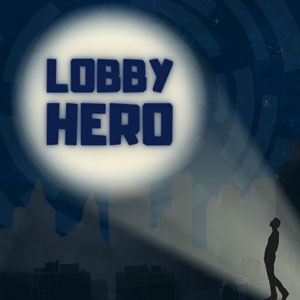
 ***** Blackmail, bullying, and bluster mark Kenneth Lonergan’s classic play “Lobby Hero.” Directed by Nate Santana, the story is a microcosm about the meaning of truth and what is considered morally wrong. Specifically, the play is about a prevailing system of quid pro quo, influence peddling, and corruption within the New York City Police Department, where officials cultivate gratitude and obtain personal power by selectively doing favors and threatening punishments. This, of course, is in contrast to the norm of good government based on fairness, justice, and treating everyone equally: where nobody is above the law and where there are penalties for unwarranted favoritism and punishments for those who violate positions of public trust.
***** Blackmail, bullying, and bluster mark Kenneth Lonergan’s classic play “Lobby Hero.” Directed by Nate Santana, the story is a microcosm about the meaning of truth and what is considered morally wrong. Specifically, the play is about a prevailing system of quid pro quo, influence peddling, and corruption within the New York City Police Department, where officials cultivate gratitude and obtain personal power by selectively doing favors and threatening punishments. This, of course, is in contrast to the norm of good government based on fairness, justice, and treating everyone equally: where nobody is above the law and where there are penalties for unwarranted favoritism and punishments for those who violate positions of public trust.
The setting is a multistory residential building lobby in Manhattan, where the lives of four people intersect. They are a security guard named Jeff (Elliot Esquivel), his supervisor William (Terence Sims), and two New York City police officers: a seasoned male officer named Bill (Adam Schulmerich) and his partner, a rookie female officer named Dawn (Emma Jo Boyden). The original play premiered in 2001 at a time when women were relatively new to the police department, as compared to today.
Jeff befriends Dawn while she remains in the foyer while Bill is apparently having an affair with a woman in apartment 22-J. Dawn is very concerned about her reputation and her future as a police officer. Perhaps she recently used too much force against a perpetrator when he rushed towards her (in a scene that precedes this show), and evidently Bill wants to use this situation against her. If he doesn’t back up her story about responding to an attack, then she is on the hook for police brutality. According to Dawn, Bill’s intent is not just to blackmail her but to potentially rape her, and she needs to ask herself how important it is to remain in the good graces of a mostly male police department and keep her job. At the same time, William has been asked by his brother to cover up a heinous crime perpetrated by himself and several others by serving as his alibi. Bill and William are acquainted with each other, and in return for unspecified current and future favors, Bill is willing to let William’s brother off the hook. Without revealing any great secrets, the “Lobby Hero” is Jeff, who becomes privy to much of this information.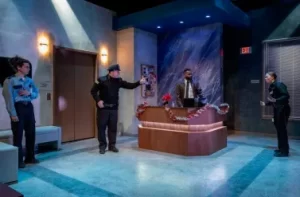
Shattered Globe Theatre’s revival of this play allows the audience to explore the “gray area” in which each of the characters has a very different relationship to truth-telling. The show largely points up how each of the four characters largely projects a false front before admitting to some very human frailties in both their personal and professional lives. Each one of them seemingly fudges the truth to make themselves look better, and, in so doing, they recraft the facts to suit their own ends. Is this a defense mechanism, meant to uphold the seeming veracity of their own judgments, particularly when it comes to possessing a sense of right and wrong? Or is the objective to make themselves look better or more important or influential than they actually are? Or do they choose to play with the truth to protect themselves, their interests, and those of their loved ones? Among other things, we watch how Jeff reveals certain truths incrementally and convincingly, just enough to get his point across so that he doesn’t incriminate himself and those who previously confided in him.
José Manuel Díaz-Soto’s pragmatic set design and Mariah Bennett’s lobby decoration felt like the late 1990s and immediately set the mood when we entered the theatre. I loved the incredible realism of all its various entrances and exits, plus the elevator! The appropriately furnished building lobby features, among other things, an indirectly lit lobby desk, a wire waste basket filled with crumbled papers, Christmas decorations, a bouquet of flowers, and (above all else) a swivel chair, used to the maximum when Jeff sails across the set on wheels. In fact, Jeff is played so authentically by Esquivel that I felt I could walk up to him and give him a hug. I adored his dance moves and his natural grace, and he never broke character once in the process. In contrast, my reaction was visceral whenever Bill (Schulmerich) took the stage with his swagger and his desire to mow down others in order to improve his own standing. He was the man you loved to hate, considering his willingness to violate the law for sake of furthering his own ego and enhancing the power of his pardon. What a great acting job!
My guest happened to be a sound engineer, who was highly impressed with Christopher Kriz’s work in sound and as an original composer. Kriz could win an award for his outstanding sound design, for example, with the sound of ambient traffic noise whenever the focus of action moved outside of the building. The lighting, designed by Ellie Fey, splendidly set the mood. For example, the lights were blue and dim when a contemplative Jeff was sitting at his desk overnight, and the lights would gradually come up whenever certain areas of the stage became the focal point for action. And, of course, the lighting splendidly delineated the scenes. Basically, the synchronicity of the sound and lighting is superb: subtle but extremely well done! Plus, Uriel Gomez’s costume design is authentic, and I especially liked all of the New York City Police Department patches on the officers’ uniforms. The graphic design with the fake UPS (SGT) tag was a very clever way to direct attendees to the digital program for the show—because it’s something that one would see inside a lobby! Having said all that, what was anachronistic was the vaping, which essentially didn’t become popular until sometime between 2011 and 2014. Since it adds nothing to the plot, it could easily be eliminated.
There are many layers to this story, largely having to do with how each character perceives of truth and justice. In one of the most telling lines in the script, Dawn says, “This isn’t Nazi Germany. We are supposed to follow the law”—and an audible titter was heard among members of the audience. Given the tenor of the times, this play gives us all pause. What is each individual’s obligation to tell the truth? At what point will people object to the use of strong-arm tactics to enforce the law—and a rogue individual’s will? With regard to the play, when do the characters find it acceptable to question a labyrinth of customs, norms, and preconceived notions, which they might have previously followed unchallenged? Which types of situations cross the line for each of them when it comes to morality and the law? Yet at the very end of the performance, the audience is left hanging with regard to how the characters choose to follow through on their careers and their private lives.
Throughout the show, we witness how the New York City Police Department apparently operates on the buddy system, presumably having its roots in the patronage system. The question I had was whether or not a system of political favoritism and corruption was actually the norm within the police department back in 2001. And if so, how much of this might have persisted up until the present day? But the answer to this question goes far beyond the scope of this review. Rather, it is better to focus on speculation as to why this play was chosen to be revived today. Why is telling the truth necessary in an era when so many don’t want to hear it? And what makes it morally wrong when people invent “alternate facts” and twist things around for their own advantage?
“Lobby Hero” is playing through March 1, 2025, at Theater Wit, 1229 W. Belmont, Chicago (in Theater One).
Tickets: $15-$52.
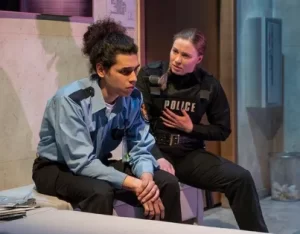 Performance Schedule:
Performance Schedule:
Thursdays, Fridays, and Saturdays – 7:30 p.m.
Sundays – 3:00 p.m.
Note that some performances are already sold out!
Accessible Performances:
Audio-Described and Touch Tour:
Friday, February 21st at 7:30 p.m. (6:15 p.m. touch tour, 7:30 p.m. curtain)
Open-Captioned Public Performance:
Sunday, February 23rd at 3:00 p.m.
For more information about Shattered Globe Theatre and this show, please visit: https://www.sgtheatre.org/season34/lobby-hero.
To purchase tickets, see: https://www.theaterwit.org/tickets/productions/529/performances?end_date=2025-02-07&start_date=2025-02-01. or call: 773-975-8150.
To see what others are saying, visit www.theatreinchicago.com, go to Review Round-Up and click at “Lobby Hero”.


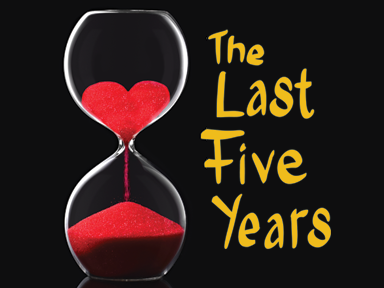

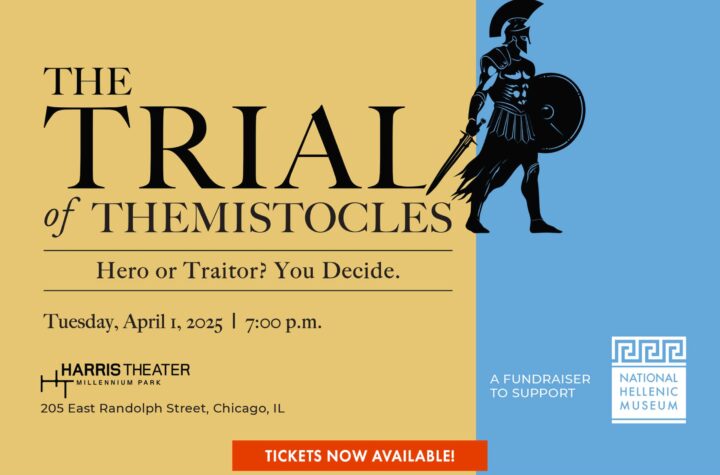
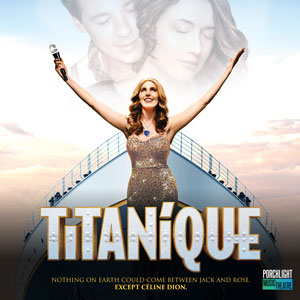
More Stories
“The Last Five Years” MILWAUKEE
“The Trial of Themistocles” reviewed by Julia W. Rath
“Titanique”